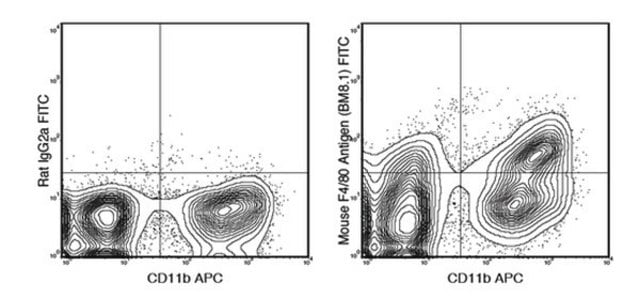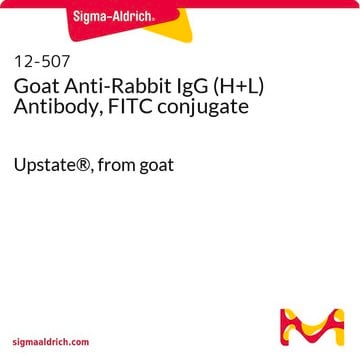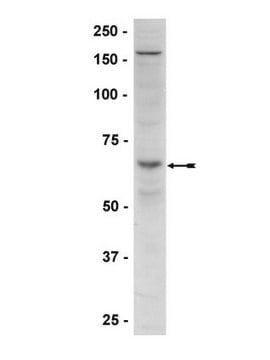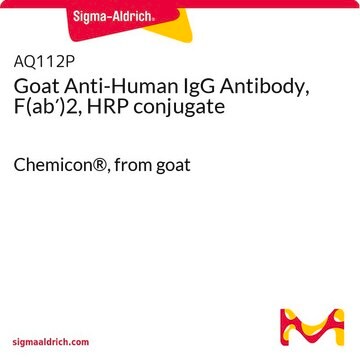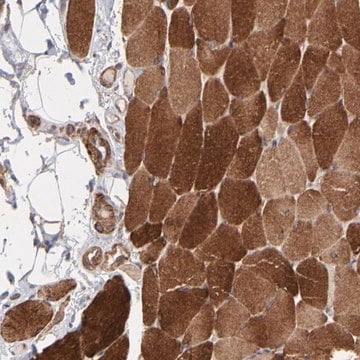SAB5500103
Anti-F4/80 antibody, Rabbit monoclonal
recombinant, expressed in proprietary host, clone SP115, affinity isolated antibody
Iniciar sesiónpara Ver la Fijación de precios por contrato y de la organización
About This Item
UNSPSC Code:
12352203
NACRES:
NA.41
Productos recomendados
biological source
rabbit
Quality Level
recombinant
expressed in proprietary host
conjugate
unconjugated
antibody form
affinity isolated antibody
antibody product type
primary antibodies
clone
SP115, monoclonal
species reactivity
mouse (tested)
species reactivity (predicted by homology)
rat
technique(s)
immunohistochemistry: 1:100
isotype
IgG
shipped in
wet ice
storage temp.
2-8°C
target post-translational modification
unmodified
Gene Information
human ... ADGRE1(2015)
General description
EMR1 (egf-like module containing, mucin-like, hormone receptor-like 1) is a human homolog of F4/80, an eosinophil-specific receptor. It is abundantly expressed on leukocytes. F4/80 is a member of the GPCR superfamily. It has N-terminal EGF (epidermal growth factor)-like domains bound to a seven-span transmembrane (7TM) moiety through a mucin-like spacer domain. This gene is located on human chromosome 19p13.
Mouse EGF-like module-containing mucin-like hormone receptor-like 1 (EMR1) or cell surface glycoprotein F4/80 is a cell surface glycoprotein and a member of the EGF TM7 family of proteins. It shares 68% overall amino acid identity with human EGF-module-containing-mucin-like hormone receptor 1 (EMR1). Expression of F4/80 is heterogeneous and is reported to vary during macrophage maturation and activation. The F4/80 antigen is expressed on a wide range of mature tissue macrophages including Kupffer cells, Langerhans, microglia, macrophages located in the gut lamina propria, peritoneal cavity, lung, thymus, bone marrow stroma and macrophages in the red pulp of the spleen. F4/80 expression has also been reported on a subpopulation of dendritic cells but is absent from macrophages located in T cell areas of the spleen and lymph node. The ligands and biological functions of the F4/80 antigen have not yet been determined but recent studies suggest a role for F4/80 in the generation of efferent CD8+ regulatory T cells.
Immunogen
Synthetic peptide derived from N-terminus of mouse F4/80 protein.
Application
Anti-F4/80 antibody has been used in immunohistochemistry.
Biochem/physiol Actions
In liquid bone marrow cultures, F4/80/EMR1 (egf-like module containing, mucin-like, hormone receptor-like 1) acts as a maturation marker for mononuclear phagocytes. EMR1 can be used as a target molecule in the treatment of individuals suffering from squamous cell carcinoma and eosinophilic disorders.
Features and Benefits
Evaluate our antibodies with complete peace of mind. If the antibody does not perform in your application, we will issue a full credit or replacement antibody. Learn more.
Physical form
0.1 ml rabbit monoclonal antibody purified by protein A/G in PBS/1% BSA buffer pH 7.6 with less than 0.1% sodium azide.
Disclaimer
Unless otherwise stated in our catalog or other company documentation accompanying the product(s), our products are intended for research use only and are not to be used for any other purpose, which includes but is not limited to, unauthorized commercial uses, in vitro diagnostic uses, ex vivo or in vivo therapeutic uses or any type of consumption or application to humans or animals.
¿No encuentra el producto adecuado?
Pruebe nuestro Herramienta de selección de productos.
Storage Class
10 - Combustible liquids
wgk_germany
WGK 2
flash_point_f
Not applicable
flash_point_c
Not applicable
Elija entre una de las versiones más recientes:
¿Ya tiene este producto?
Encuentre la documentación para los productos que ha comprado recientemente en la Biblioteca de documentos.
The mononuclear phagocyte system of the mouse defined by immunohistochemical localization of antigen F4/80. Relationship between macrophages, Langerhans cells, reticular cells, and dendritic cells in lymphoid and hematopoietic organs.
Hume DA, et al.
The Journal of Experimental Medicine, 158(5), 1522-1536 (1983)
Kelly L Harris et al.
Oncotarget, 7(20), 28947-28960 (2016-03-10)
Consumption of Western diet (WD), contaminated with environmental toxicants, has been implicated as one of the risk factors for sporadic colon cancer. Our earlier studies using a mouse model revealed that compared to unsaturated dietary fat, the saturated dietary fat
EMR1, the human homolog of F4/80, is an eosinophil-specific receptor
Hamann J, et al.
European Journal of Immunology, 37(10), 2797-2802 (2007)
Western diet enhances benzo(a)pyrene-induced colon tumorigenesis in a polyposis in rat coli (PIRC) rat model of colon cancer
Harris KL, et al.
Oncotarget, 7(20), 28947-28960 (2016)
Human EMR2, a novel EGF-TM7 molecule on chromosome 19p13.1, is closely related to CD97
Lin HH, et al.
Genomics, 67(2), 188-200 (2000)
Nuestro equipo de científicos tiene experiencia en todas las áreas de investigación: Ciencias de la vida, Ciencia de los materiales, Síntesis química, Cromatografía, Analítica y muchas otras.
Póngase en contacto con el Servicio técnico

